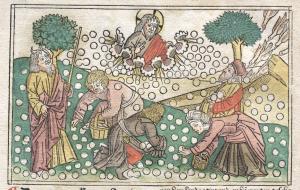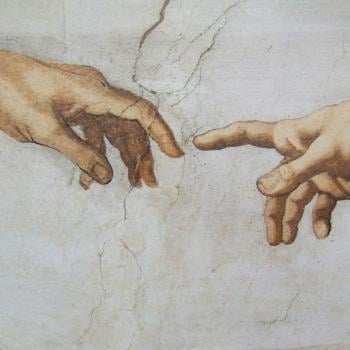
We must be careful in the way we deal with and engage God’s bountiful gifts. We should not think of them as mere material objects to be accumulated. We must avoid the prompting of greed, for it would suggest we hoard what God gives us, hiding it away from all so that we alone could possess it for all time. This is not what God wants us to do. We are not to hide the talent of grace in the ground. Every attempt to control grace and the blessings which come with it will end with us losing it. We cannot store up grace in the manner. We are told that the people of Israel had to learn this lesson when they were on their journey to the promised land. They were given manna to eat, a gift which God provided them so that they could and would be sustained in their long journey. It was decreed they should take what they needed for the day (and an extra measure on the day before the Sabbath so as not to work on the Sabbath), and nothing more:
This is what the LORD has commanded: `Gather of it, every man of you, as much as he can eat; you shall take an omer apiece, according to the number of the persons whom each of you has in his tent.'” And the people of Israel did so; they gathered, some more, some less. But when they measured it with an omer, he that gathered much had nothing over, and he that gathered little had no lack; each gathered according to what he could eat. And Moses said to them, “Let no man leave any of it till the morning.” (Ex. 16: 16-19 RSV).
Nonetheless, they did not listen. They thought they could store up manna for the future. But it was all in vain, as manna could not be stockpiled:
But they did not listen to Moses; some left part of it till the morning, and it bred worms and became foul; and Moses was angry with them. Morning by morning they gathered it, each as much as he could eat; but when the sun grew hot, it melted (Ex. 16:20-21 RSV).
God gave them manna. Indeed, God desired them to realize that they could and should rely upon divine benevolence for their daily needs. God did want them to abuse the gifts given to them and use it as the foundation for avarice and the sins which follow with avarice. God wanted them to realize the bounties of the earth are to be shared and used appropriately. To combat the temptation to treat God’s blessings as mere objects to be accumulated and used for personal gain, God made sure that whatever manna they collected in excess was ruined. This shows us what happens whenever we try to manipulate and use God’s blessings for our inordinate pleasure: they will vanish, and all we will have left will be rotten to the core. The lesson is a universal one, and one which can and should have application in many forms, as there are many ways we can try to gain control of and unjustly dominate the goods God has given us. For example, we can see this in the way many of us use and abuse the earth which we live on; due to our actions, the earth is laid to waste; unless we change our ways and act as proper stewards of the earth, we risk losing everything.
This is a lesson that many of the Desert Fathers and Mother had to learn. One would think that they would not need the reminder, because they had become ascetics, but often, that was not the case. They might not be interested in money, but they could and would easily find something which could turn their attention away from their detachment from the world. An example of this is found in a story associated with Abba Doulas, a disciple of Abba Bessarion:
Abba Doulas, the disciple of Abba Bessarion said, ‘One day when we were walking beside the sea I was thirsty and I said to Abba Bessarion, “Father, I am very thirsty.” He said a prayer and said to me, “Drink some of the sea water.” The water proved sweet when I drank some. I even poured some into a leather bottle for fear of being thirsty later on. Seeing this, the old man asked me why I was taking some. I said to him, “Forgive me, it is for fear of being thirsty later on.” Then the old man said, “God is here, God is everywhere.”‘ [1]
Because Abba Doulas thought he might need water in the future, he did what many of us would do, and tried to collect some of the water which had been made sweet and save it for later. He went beyond what he was told to do. He had been encouraged to drink, but nothing more. He took more than he needed. He should have realized that the gift which had received could be and would be given again if needed. If God could make salt water sweet once, God can do it again. There was no need to hoard up water for the future, just as there was no need for the people of Israel to hoard up manna. To do so showed lack of faith. Indeed, it was worse for Abba Doulas, for he should have known better. He was a monk. Having embraced the habit of detachment, he went beyond what he was told to do by collecting the water; he could drink of it, as needed, but to take more than was needed could only lead to his own reproach, because then it represented the foundation for avarice setting itself up in his life. By taking extra water, he overturned his voluntary poverty.
Most of us, of course, are not ascetics, and so are not expected to engage detachment in the extreme fashion of such ascetics. But we are still called to detachment, to realize the limitations not only of worldly goods, but of all our attempts to contain and control the blessings of God. God will not be manipulated. God’s gifts are not something to store up and keep for ourselves alone. God is here, there, and everywhere. We must not try to control God. We are to take and use what we have been given, but if we try to dominate and control the blessings of God, we will not receive the bounties of grace which we desire. We want, after all, the flowing waters of the Spirit. To receive them, we must allow them to flow, not only in us, but through us; we must let grace by shared with all. We must let the Spirit blow where it will. We should receive the gifts which we are given and engage them in the way they are meant to be engaged, realizing that they are not to be greedily stored up for the future but to be used when they are given to us, for they are given to us for our particular context. If we need something later, we must trust God will give it to us then.
[1] The Sayings of the Desert Fathers. trans. Benedicta Ward (Kalamazoo, MI: Cistercian Publications, 1984), 40 [Saying of Abba Bessarion 1]
Stay in touch! Like A Little Bit of Nothing on Facebook.
If you liked what you read, please consider sharing it with your friends and family!













